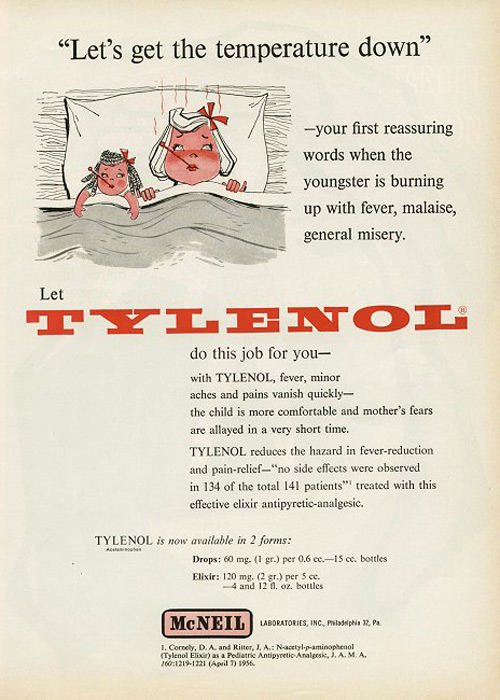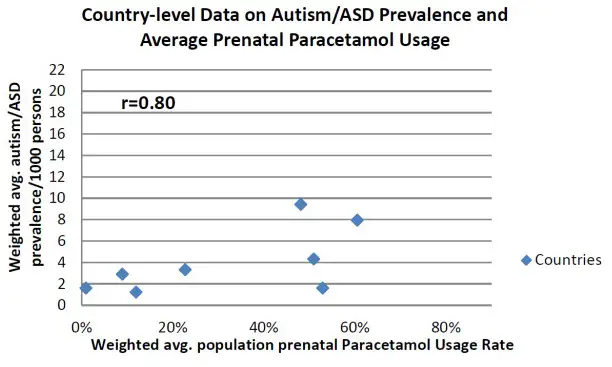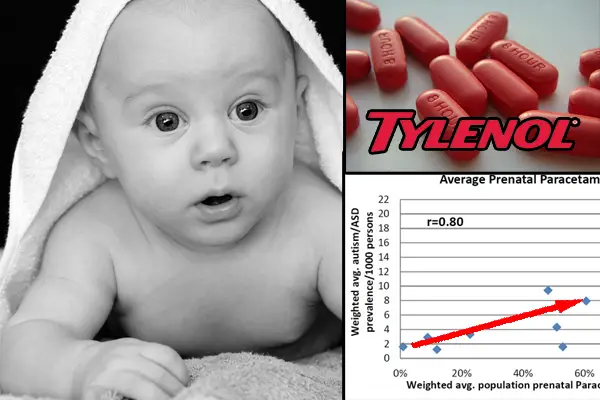In the recent decades there has been a huge increase of neurodevelopmental disorders. Today, 1 in 68 children have autism spectrum disorder (ASD) and 11 percent of American children, ages 4 to 17, have attention-deficit/hyperactivity disorder (ADHD).
More and more studies have been pointing to the growing number of vaccinations and their additives as one possible reason, but they are not the only ones to be concerned about.
During the last few years studies started coming out that show a correlation between prenatal use of a common painkiller Tylenol (active ingredient acetaminophen) and an increased risk of both neurodevelopmental disorders, ASD and ADHD in children.

Johnson & Johnson always had targeted ads to promote Tylenol for children’s use. New studies show that may not be as safe as the drugmaker presents it to be. Source: www.propublica.org
While doctors often prescribe various medications, including Tylenol, for pregnant women, most of the drugs on the market have never been studied for prenatal use.
On the package of Tylenol, it reads: “If pregnant or breast-feeding, ask a health professional before use.”
For the patient, it does not say anything else about prenatal use; not on the drug’s insert, not on the official Tylenol site.
There is a separate website for medical professionals only, and this is where one can find studies and safety information. Under studies we see just one study on acetaminophen for post-surgical dental pain. The study did not include pregnant women.
“Female subjects who were pregnant or breastfeeding were not eligible for enrollment.”
But in the U.S. National Library of Medicine there are other acetaminophen studies that Tylenol’s maker Johnson & Johnson does not mention. (Just as they forgot to tell the consumers that their baby powder causes cancer).
Studies That Link Acetaminophen (Tylenol) to Autism and ADHD
There are multiple studies that call attention to the fact that prenatal use of Tylenol has not been properly studied.
“Acetaminophen is extensively used during pregnancy. But there is a lack of population-representative cohort studies evaluating its effects on a range of neuropsychological and behavioral endpoints,” state researchers from a 2016 study published in International Journal of Epidemiology.
The study found that prenatal Tylenol use carries an increased risk for a child to develop autism or ADHD. The more acetaminophen the mother took during pregnancy, the larger the risk.
This is not the first study that raised a red flag for potential autism-acetaminophen connection.

The 2013 article showed that in 8 countries that provided statistics, higher paracetamol (acetaminophen) use correlated with higher autism rates.
A 2013 article in Environmental Health concluded that there is a strong possibility that the exposure to paracetamol before or after birth increases the child’s risk of developing autism spectrum disorder.
“[The] use of paracetamol in pregnancy and/or early childhood may alter immune processes increasing the risk of autism spectrum disorder in susceptible individuals.”
A 2014 study in JAMA Pediatrics found that:
“Maternal acetaminophen use during pregnancy is associated with a higher risk for HKDs and ADHD-like behaviors in children.”
Can Tylenol Really Trigger Autism?
While the world is waiting for more studies to come out, one naturopathic doctor has presented a hypothesis based on understanding of the human body.
Dr. Erika Krumbeck ND, a naturopathic doctor in Missoula, MT, hypothesizes that acetaminophen triggers autism in already susceptible children because it depletes glutathione, the all-important “master” antioxidant that the human body produces. Glutathione is active in the brain unlike most other antioxidants, and is protective of the brain functions. The antioxidant also helps to detoxify the body.
Research has shown that children with ASD and ADHD have impaired detoxification pathways and depleted levels of glutathione. This connection points to a hypothesis that Tylenol may increase the risk of autism because it depletes levels of glutathione in children when their mother takes this drug (at the wrong times and/or dosages at least) during pregnancy.
So, what do you think? Does it sound a little too crazy to be true? Watch a short TV story about Tylenol and the ADHD risk below and decide for yourself:
Thanks for installing the Bottom of every post plugin by Corey Salzano. Contact me if you need custom WordPress plugins or website design.












